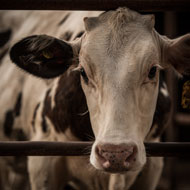
Over 120 million animals slaughtered without pre-stunning between October 2017 and September 2018
The BVA and the RSPCA have issued a joint call to the Government to bring an end to non-stun slaughter.
The call comes as new figures reveal more than 120 million animals were slaughtered between October 2017 and September 2018 without being stunned first.
In a letter to environment secretary Michael Gove, BVA and RSPCA call for a change in legislation in England, which currently allows non-stun slaughter for religious purposes. They also call on the Government to release the 2018 Food Standards Agency slaughter survey results, which were due for release in Autumn 2018.
Until such legislation is implemented, the BVA and the RSPCA would like to see measures introduced to limit animal pain and suffering. These include a call for meat to be labelled with the method of slaughter so that consumers are fully informed about the meat they are buying.
The letter follows a ban on non-stun slaughter in the Flanders region of Belgium, which came into force at the beginning of 2019. Belgium joined Iceland, Sweden, Switzerland and Denmark in making this decision, 'demonstrating that a full ban on non-stun slaughter is possible within EU law.'
“Our concern does not relate to the expression of religious belief but the welfare of animals," said RSPCA chief executive Chris Sherwood. "Until there is a change in the law to end non-stun slaughter, there are several measures the UK Government could introduce to reduce the suffering involved in this practice.
“For example, by ensuring trade deals with other countries do not include non-stun meat or live animals for non-stun slaughter, clear labelling should be adopted to enable consumers to make an informed choice about the meat they buy and how it was slaughtered."
Other calls include non-stun slaughter to only be permitted at levels that meet local religious community demand, and an immediate post-cut stun for cattle, sheep, goats and deer to reduce the period of pain and distress.
BVA President Simon Doherty said: “The UK Government has repeatedly stated it would prefer to see all animals stunned before slaughter but has taken no action to address this critical welfare issue that affects millions of animals every year. It is doubly disappointing that data that would have provided a valuable benchmark for levels of non-stun slaughter in the UK has yet to see the light of day despite assurances throughout last year that it would soon be made public.
“There is a huge groundswell of support for a ban on non-stun slaughter, and recent developments in Belgium show that decisive change is possible where public support is matched by political will. Michael Gove has made clear that he wants to maintain and build on the UK’s reputation as a global leader on animal welfare; banning non-stun slaughter is a surefire way of showing he will deliver on this commitment.
“If slaughter without stunning continues to be permitted in the UK, then meat and fish from this source must be clearly labelled, to help customers make informed choices about the food that they buy and eat.”



 The Federation of Independent Veterinary Practices (FIVP) has announced a third season of its podcast, Practice Matters.
The Federation of Independent Veterinary Practices (FIVP) has announced a third season of its podcast, Practice Matters.